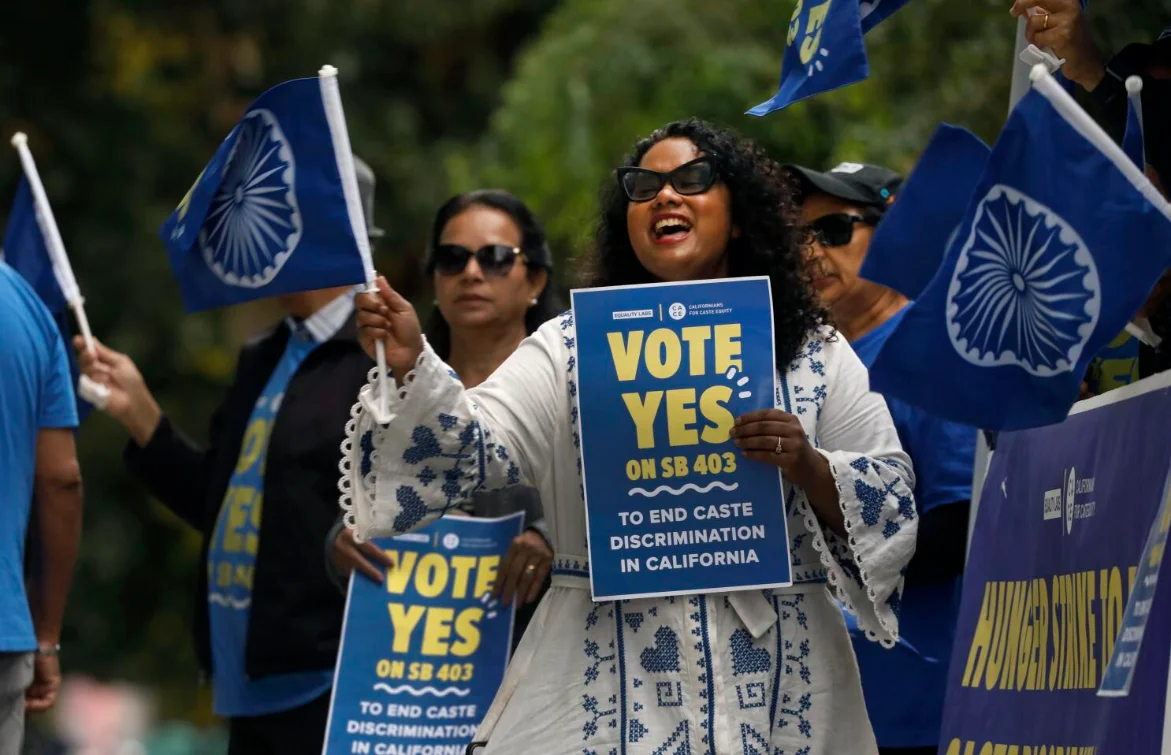Governor Gavin Newsom’s decision to veto a bill aimed at prohibiting caste discrimination in California has left some supporters of the legislation “heartbroken,” while others who were against it feel relieved, believing it would have unfairly stigmatized a minority group in the state.
The bill itself, along with the discussions and events leading up to its consideration by state lawmakers and eventual veto, sparked heated debates both within California and beyond.
Advocates against caste discrimination argue that it is no different from other types of discrimination, such as racism, and therefore should be made illegal. They had hoped that if California passed this law, it might set a precedent for similar legislation in other U.S. states.
Critics of the proposed law argued that it would unfairly label an entire minority, particularly the South Asian and Hindu communities, as discriminatory, unfairly painting them with a broad brush.
Angana Chatterji, a scholar from the University of California, Berkeley, explained that caste discrimination has a deep and harmful impact on South Asian communities in the United States. She noted that the California bill acknowledged the essential right to equality for all who face caste-based discrimination.
Supporters of the legislation had begun a hunger strike in early September to urge its approval. However, Governor Newsom vetoed the bill, known as Senate Bill 403 or SB 403. He reasoned that existing laws already forbid discrimination based on ancestry, making this specific bill redundant.
The Hindu American Foundation, which had been against the bill, sided with Newsom’s decision and celebrated the veto as a significant victory.
Hindu American Foundation Executive Director, Suhag Shukla, explained, “Discrimination based on ‘caste’ goes against Hindu teachings and is also against current state and federal laws. The debate surrounding SB-403 has always focused on finding the best way to address discrimination within the community, not whether such protections are necessary.”
In the United States, laws against discrimination prohibit ancestry-based discrimination but do not explicitly mention the prohibition of caste discrimination. California’s bill aimed to address the caste system within South Asian and Hindu immigrant communities by including caste as a protected category under the state’s existing anti-discrimination laws.
The caste system is one of the world’s oldest forms of rigid social hierarchy, with a history spanning thousands of years. It grants privileges to those in higher castes while oppressing those in lower castes. The Dalit community occupies the lowest position in the Hindu caste system and has historically faced severe discrimination, often referred to as “untouchability.” India banned caste-based discrimination more than 70 years ago.
Thenmozhi Soundararajan, the executive director of Equality Labs, a Dalit civil rights organization in California, shared her personal experience: “I grew up in Orange County, where I was subjected to caste-based bullying throughout my school years.”
In her testimony supporting the bill in April, Soundararajan emphasized, “Californians who face caste-based oppression are here, and we deserve workplaces and schools that are free from discrimination and violence.”
Equality Labs expressed deep disappointment at the governor’s decision to veto the bill.
The Indian diaspora in the United States includes approximately 4.9 million residents with Indian roots, according to the Migration Policy Institute. Among them, approximately one million live in California.
Numerous human rights organizations, including the American Civil Liberties Union (ACLU), Amnesty International, and MeToo International, supported the bill.
On the other hand, opponents argued that since U.S. laws already prohibit ancestry-based discrimination, this legislation would be redundant and unfairly stereotype Hindu and South Asian communities.
The initial version of the bill was modified following some resistance. In the revised version, caste was categorized under “ancestry” rather than being treated as a distinct category. The revised bill received nearly unanimous support when it passed through California’s state Assembly in late August and the state Senate in early September.
Samir Kalra, the managing director of the Hindu American Foundation, expressed his perspective: “Creating a separate category and law that exclusively pertains to minority communities goes against our constitutional principles.”
In the bill’s language, caste was defined as “an individual’s perceived position in a system of social hierarchy based on inherited status.”





